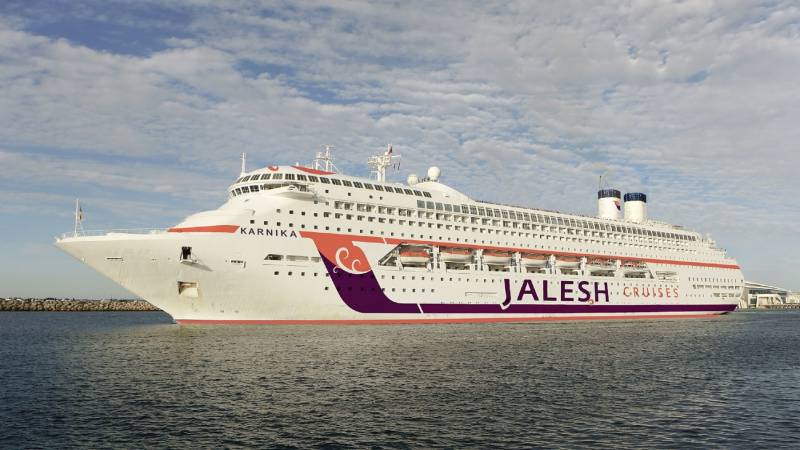There is nothing to celebrate on this World Tourism Day 2020: Jurgen Bailom, CEO Jalesh Cruises
As we are celebrating world tourism day, how seriously is the tourism industry in India threatened by the pandemic and do you see a meaningful revival in foreseeable future?
On the occasion of World Tourism Day 2020, the travel and tourism industry knows that there is nothing to celebrate this year. The world is in mourning and so are we, but one has to push back and overcome this mourning period at some point in time. The tourism industry in India is definitely not threatened by the pandemic, COVID-19 has however bought the industry to an uncertain pause. This pause was expected to last for a month or two but now we are in the sixth month and the risk of traveling remains. Regardless of all these problems, the travel industry is just focusing on the revival of the industry in the nearing future and for a post-COVID era. From domestic travel stakeholders to international ones, everyone is preparing and planning a way to travel reducing the risk factor, by putting precautions in place. The near future is only going to give the travel industry a sudden spike as well, the reason being everyone – the ones who enjoy travelling and the ones who don’t will be travelling.
What has the government done to enhance domestic tourism in India, specifically in 2020?
In 2020, the tourism ministry has tried to revamp the whole tourism sector in India. Tourism has been a major contributor to India’s economy and given the changing dynamics of the industry, the Indian government is trying to keep up to pace. Recently, the tourism minister met stakeholders to understand how can ‘Incredible India’ be promoted post-COVID-19, they also involved several travel bloggers/influencers who are the future of travel. Incredible India’s recent campaign also has travel influencers across the globe involved, this will help revive the standstill domestic travel industry.
MTDC, the Maharashtra Tourism Development Corporation also recently came up with a plan to revamp its services. The most innovative step is starting medical wellness tourism across 30 resorts in the state focusing on naturopathy and therapeutic treatments to help one relax and build strength, mentally as well and physically. Lastly, I would like to add about the decision taken by the Shipping Ministry which has given the cruising industry a ray of hope, wherein it announced a reduction in port tariff rates ranging from 60 pc to 70 pc for cruise ships effective from 14th August 2020, with an immediate reduction in port charges for the Cruise industry. This will support the economy post the COVID- 19 pandemic.
Since the theme for World Tourism Day is Rural Development, do you think much has been done to promote rural India?
Rural India is what makes India, while there are metropolitan cities that are running the economy, rural India has and will always be the backbone of developing India. To quote Mahatma Gandhi, “The future of India lies in its villages” and the government as well as the people have of India will always value rural India. More than the government or some external body promoting rural India, rural India is self-promotional. Like I mentioned earlier, the travel industry dynamics are changing and one major trend observed over the past few years is the travelling audience shifting their preference from going to a Tier-1 city overseas to domestically visiting off-beat tourist spots. Many of these off-beat tourists’ spots are a part of rural India. Agro-tourism, eco-tourism and treks have and are helping develop rural India. People in Tier 3 regions are now also promoting their culture by tourism and this vivid diversity of the country is also what attracts maximum tourists. For example, Jalesh Cruises’ ship Karnika would also visit local and rural destinations such as Ganpatipule and Diu. When travellers visit rural India, it has always uplifted and helped rural India develop. Many rural regions that are frequently visited by tourists have made advanced, Wi-Fi is available in more areas, the locals learn different languages, etc. but most importantly such changes have helped rural India financially and with literacy.

Jurgen Bailom, CEO of Jalesh Cruises says domestic tourism will revive first & cruise tourism amongst safest in industry
What role has cruise tourism played in rural development in India?
Like I mentioned earlier, Jalesh Cruises’ Karnika visits places such as Ganpatipule and Diu and when we go to such places, the local vendors, the offshore staff is getting employment which draws a direct link to rural development. Goa was once upon a time completely rural with few tourists, it is safe to assume that the cruising culture in Goa also gave its economy and tourism a boost. The cruise industry also creates many job opportunities for Indians across the country.
How can domestic tourism help in the revival of the economy?
While full-fledged tourism looks like a long shot, we foresee domestic travel as first to resume therefore tourism within the country attracts tourists. Hometown, road trips will more common than ever. Trends like these will see a rise compared to leisure travel overseas. The lockdown has helped nature heal, and therefore domestic nature tourism will be the start of tourism again. We can already witness people in Mumbai travelling to isolated places nearby such as Lonavala, Matheran.
Domestic cruise tourism holds an opportunity during these times and the safest one as one interacts with a set number of people adhering to strict precautions. Micro-holidays and local travel will be new travel trends. Most certainly, these tourism trends will be practiced with certain precautions such as smaller groups, short trips, social distancing, and so forth. Considering the uncertainty of future travel, we have also introduced the concept of Future Pass, wherein travellers can book now, anytime until August 2021, and decide the sailing dates later.
How has Jalesh Cruises been impacted by the pandemic and what is the potential of cruise tourism in India and were we on track towards achieving that potential before the pandemic?
The cruising industry is impacted by the pandemic and so has Jalesh Cruises. In pre-COVID times, the cruising industry had a lot of potentials, unfortunately, the COVID era has bought this industry to a pause. However, we firmly believe that cruise travel will be most demand in the post COVID era, the reason being the safety and utmost precaution measures cruises will have in place. The biggest advantage will be the limited interaction with people since one travels on the sea, thereby reducing the chances of contracting COVID. Jalesh has also put together a Pandemic Preparedness Plan (PPP), this plan determines the adoption of several measures and initiatives that are in line with the general recommendations of the World Health Organization (WHO), Center for Disease Control (CDC) of the USA, Healthy Gateways of EU and IMO.
These measures are evaluated daily and reviewed thus ensuring a daily update on the situation, trying to tackle it better, and not leave a scope of doubt. We have an internal team that permanently monitors the evolution of the epidemic outbreak, which is constituted in accordance with the pandemic preparedness plan and with the rules of internal governance in matters of crisis management. The plan will be in action as soon as the cruise resumes. I would like to conclude by saying that, we had a lot of potential pre-pandemic and post, we might just surpass our potential goals with one that is higher.










